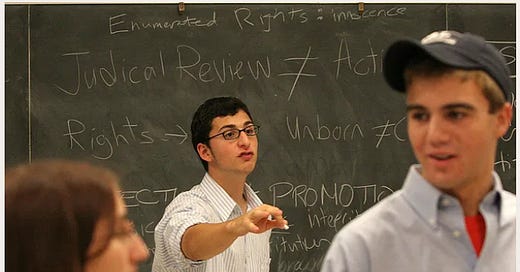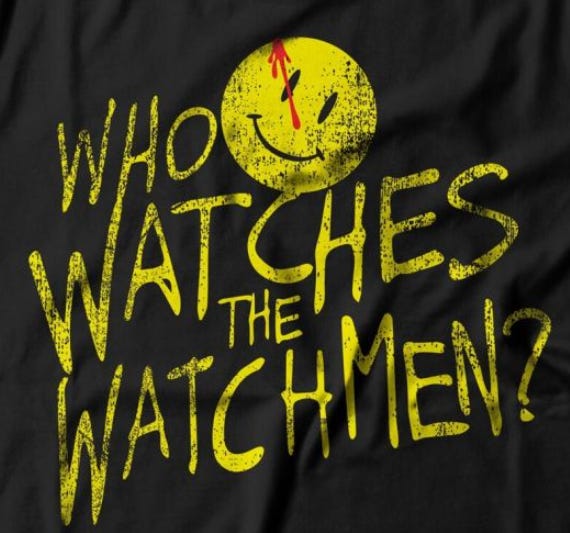Pop Quiz: How are members of our judiciary selected?
Answer: In regard to our Federal Judiciary, they are nominated by the President and then confirmed by the Senate for a lifetime appointment. In regard to most states, they are elected positions serving predetermined terms.
In both of these cases, the opinions of the proposed judge matters. In the case of the President nominating a justice, they are chosen because of their previous decisions, outcomes and personal opinions that presumptively align with what the President’s are. As they are lifetime appointments, Judicial Appointments represent the greatest legacy of a President long after he leaves office. In the case of elected judges, they campaign with the themes, issues, and perspectives brought before the electorate who then decide.1 Neither option is particularly ideal; justice is supposedly blind, but its becoming more predetermined before the cases are even heard.
I thought about that when I read an article this weekend about a growing controversy regarding the High School Debate program. When it comes to learning debate, it’s important to remember a few things:
Quite often, the parties do not choose what their topic is or their position; it is given to them.
The purpose is not “Which side of an argument is the correct one,” it’s in each team organizing an argument, putting in evidence that supports that point of view and using verbal abilities to counter the opponent’s arguments. As it was described to me by my Speech teacher in High School and my Moot Court advisor in Law School, competitions like this focus on the “How” and not so much on the “What.” In fact, there are some advantages to taking an unpopular position and creatively making arguments in favor of it.
Debate is not a contest of “the best position wins.” Its a forum that serves as a practice ground for future lawyers and leaders to learn the nuances of speech and making arguments.
When it comes to judges, they are supposed to focus on how the arguments are made. So for instance, here is a good example:
Here is another version:
So what is the controversy? I’ll let James Fishback who wrote the article2 explain:
Or this:
Again, quite often the position the students take are not chosen but assigned. Imagine for a group of white students trying to make the case that was given to them that may have a pro-POC component to it but are not allowed to make that case because the judge would mark you down for it? The absurdity of it is galling.
Or in my opinion, the most offensive of the ones cited in the article:
Aside from the fact this is racial discrimination, it is patently against the rules. Not only should this person be removed as a judge she should be barred from ever participating as a judge in even a baking competition or spelling bee. One does not get to allow a party to break the rules and turn a blind eye towards it just because you are impartial to that side. In fact, impartiality is supposed to be against the rules altogether in this, but some judges seem to be taking pride in their “infallable” belief systems.
In my mind, their paradigms are flat out disqualifying. Who are these judges? In many cases, they are previous debate winners or participants who now are using the platform to push a particular political opinion. They tend to be younger and more idealistic than concerned about structure or the forum itself. Worse yet, these positions ultimately are counterproductive as they breed resentment, and seethe with condescension. There is clearly a conflict of interest here where they cannot judge the participants unbiasedly, but instead interject their own personal beliefs into the judgments. You win or lose the debate the day your position is assigned to you, and it doesn’t matter how well you argue, how strong your evidence or how incompetent your adverse party may be.
After reading the article and being sufficiently outraged by the stupidity of these judges, an even sadder thought permeated my brain and my heart sank. How is this any different than what occurs daily in our justice system? Judges are chosen to those positions not based on their ability to judge fairly but because of their biases towards particular outcomes. The ones above, in a sad way, are just honest about their biases. The cynical view would be to say the “Days of calling balls and strikes”3 are over.
One of my law professors once said you can start any argument in court with the sentence, “This is a question of fundamental fairness.”4 It seems like that is no longer the case, both in our courts and in our debate societies all across America.
PurpleAmerica’s Recommended Stories
The single best book I’ve ever read about debate and making good arguments was by attorney Gerry Spence, “How to Argue and Win Everytime.” It was almost like a Bible to me in Moot Court in law school, even though I never actually won in Moot Court in law school.
PurpleAmerica’s Obscure Fact of the Day
The “Twinkie Defense” has become a shorthand for making an insane, ludicrous argument in court that should have no merit whatsoever. It derives from the murder of San Francisco City Councilmember Harvey Milk, by another Councilmember Daniel White.5
White's defense was that he suffered diminished capacity as a result of his depression, a symptom of which was a change in diet from healthy food to Twinkies and other sugary foods. Contrary to common belief, White's attorneys did not argue that the Twinkies were the cause of White's actions, but that their consumption was symptomatic of his underlying depression. The product itself was only mentioned in passing during the trial.
You know what? It worked. White’s defense sufficiently knocked it down to voluntary homicide instead of the first degree murder charges the D.A. sought. He served five years and was released.
PurpleAmerica Cultural Criticism Corner
As a general rule, lawyers hate legal shows. Drama usually requires higher degrees of antagonism that get played up for the viewers; this is the kind of thing Debate Clubs are meant to curb and prevent. Very few films get the court procedures correct and far more often lawyers are portrayed as antagonistic against the witnesses. This is actually quite rare. Lawyers are trained to be as polite and positive as possible; sure there are certain rules regarding how you can treat witnessed depending on which party they are supporting, but those are minor compared to the conduct of the attorney questioning.
There is one movie that generally gets it right, and if you ask any judge or attorney who was the best depiction of a lawyer they can think of, the answer invariably is Raul Julia in the movie, “Presumed Innocent.” He demonstrates a command of the facts, espouses etiquette and graciousness, and even when sounding sarcastic he never shows an ounce of maliciousness.
His best scene in the film is when he takes down a duplicitous coroner on the stand, but if you want to see what making a good argument looks and feels like, particularly when the facts are not as clear-cut as that one was, watch his manner in his cross examination of Brian Dennehy. Masterclass.
Outstanding Tweet
Not a tweet today, but a constant theme that keeps recurring with judges…
Footnotes and Parting Thoughts
Let me know what you think of the page. Please share and comment!
For a long time, judges campaigning was seen as uncouth. However, as the stakes continue to rise and issues become more contentious, we’ve seen more money and direct campaigning in state judicial contests.
This saying in reference to judges arose from Chief Justice John Roberts’ Senate Confirmation hearings. To deflect from questions about how he would rule in certain cases, he said that the judges role was just to call balls and strikes. It was a fraudulent statement then as it is now, since Roberts was not chosen based on his ability to call balls and strikes, but nonetheless, its become a good rule of thumb of what we want in a justice.
He also said most judges who hear that would likely consider your argument weak if that’s what you started out with.
He had also shot San Francisco mayor George Moscone at the same time. But given that Milk was one of the first openly gay politicians in the country and there was a substantial amount of celebrity around him, his assassination was both the focus of White and received the bulk of the attention.












Great piece! Just found you guys. Bonus points for the Watchmen reference!
On the substance, the judge who will not give points to anyone who defends Zionism should not only be disqualified from being involved in any organization of prominence in any field, but should also be treated with the same distain generally reserved for Richard Spencer. The notion that the desire for a Jewish state is inherently a materialization of white supremacy and colonialism is the kind of anti-semitism typically not seen outside of David Duke's hangouts, but dressed up as socially enlightened and moral, which in its own way is more pernicious.